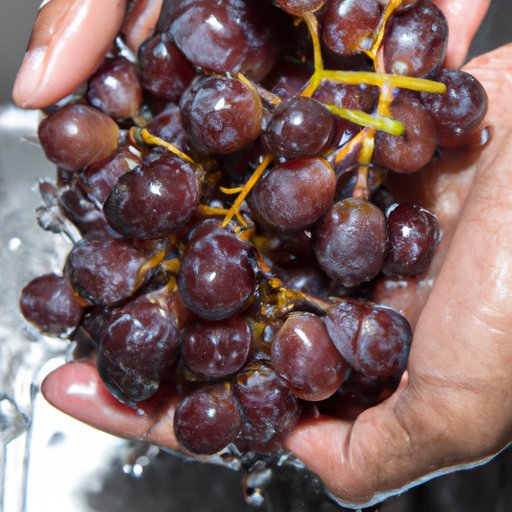
Introduction
Most people don’t think twice before popping grapes directly into their mouths, but there are many reasons why it’s important to wash them first. Grapes can harbor bacteria, pesticides, and other contaminants that could be harmful if consumed. The good news is that washing grapes is a simple process that can be done quickly at home. In this article, we’ll explore why washing grapes is necessary, and we’ll provide a step-by-step guide on how to do it effectively.
The Complete Guide to Washing Grapes: A Step-by-Step Process
The first step in washing grapes is to remove them from the stems. It’s best to do this under running water to ensure that any dirt or debris is washed away. Next, place the grapes in a colander or strainer and rinse them thoroughly under cool water. Be sure to rub them gently between your fingers to remove any dirt or residue that may be left on the skin of the grapes. If the grapes are particularly dirty, you may want to soak them in a bowl of cool water for a few minutes before rinsing them again. Finally, dry the grapes by laying them out on a clean kitchen towel. Avoid using paper towels, as the lint can stick to the grapes.
If you don’t have a colander or strainer, you can wash grapes in a bowl of water. Simply fill a bowl with cool water and add the grapes. Swirl them around in the water, removing any dirt or debris, and then rinse them thoroughly under cool water. Again, be sure to rub the grapes gently as you wash them.
The Scientific Approach to Cleaning Grapes for Consumption
The scientific reasons for washing grapes before eating are quite straightforward. Grapes can contain bacteria, pesticides, and other harmful substances that can cause illness if consumed. Washing grapes removes these contaminants and reduces the risk of foodborne illness. Additionally, washing grapes can help remove any waxes or coatings that may have been applied to the fruit during processing or shipping. These coatings can give grapes an off-taste or texture, so it’s important to remove them before consumption.
It’s also worth noting that some grapes may be treated with sulfur dioxide to preserve their color and flavor. While this is generally considered safe, some people may have an allergic reaction to the compound. Washing grapes can help remove any excess sulfur dioxide that may be present on the skin of the grapes, reducing the risk of an allergic reaction.
Maximizing Flavor: How to Wash Grapes the Right Way
Believe it or not, washing grapes can also affect their flavor. Washing grapes in warm water can cause them to become mushy or lose their flavor. It’s best to wash grapes in cool water, as this will help preserve their texture and taste. Additionally, you may want to add a small amount of vinegar to the water when washing grapes to help remove any dirt or debris that may be present on the skin of the fruit.
If you’re looking to enhance the flavor of your grapes even further, try washing them with a mixture of water and baking soda. This can help remove any residual pesticides or contaminants on the skin of the grapes, leaving them fresh and flavorful. Another option is to wash your grapes with a fruit and vegetable wash product, which is specifically designed to remove dirt, bacteria, and pesticides from produce.
5 Surprising Techniques for Cleaning Grapes at Home
If you’re looking for some unique ways to wash grapes, look no further than these five techniques:
- Hanging the grapes from a string and spinning them around in a bucket of water to remove dirt and debris.
- Washing grapes with a mixture of water, lemon juice, and salt to enhance their flavor.
- Using a salad spinner to dry grapes quickly and efficiently.
- Washing grapes with sparkling water to add a bit of fizz to their flavor.
- Washing grapes with a mixture of water and hydrogen peroxide to remove bacteria and contaminants.
While these techniques may not be necessary for everyday grape washing, they can be a fun and creative way to mix things up in the kitchen.
Washing Grapes: Why It’s Necessary and How to Do It Quickly and Efficiently
In summary, washing grapes is an essential step in ensuring that they’re safe for consumption. Whether you’re concerned about bacteria, pesticides, or other contaminants, washing grapes is a simple process that can be done quickly and efficiently right at home. To wash your grapes quickly, try using a salad spinner or washing them in a strainer under running water. To enhance their flavor, try washing them in cool water with a bit of vinegar or baking soda. Whatever method you choose, be sure to rinse the grapes thoroughly and dry them well before enjoying them.
Do You Know How to Effectively Clean Grapes? Here’s What You Need to Know
Washing grapes may seem like a simple task, but doing it properly is essential for ensuring that your fruit is safe and delicious. By following the steps outlined in this article, you can be confident that your grapes are free from contaminants and ready to eat. Don’t forget to share this article with others who may not know how to wash grapes effectively!
Conclusion
Washing grapes is an important step in preparing them for consumption. Not only does it remove harmful bacteria and contaminants, but it can also help enhance their flavor. By following the steps outlined in this article, you can ensure that your grapes are clean, safe, and delicious. If you have any questions or comments about washing grapes, be sure to leave them below.





